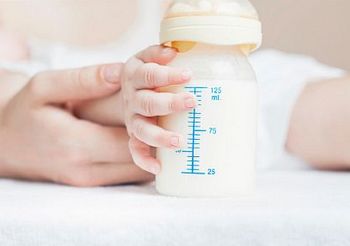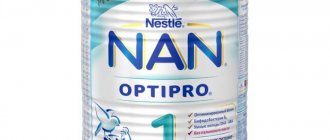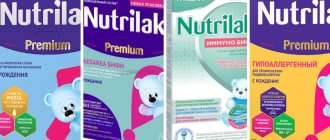22 Nov03759
Irina Ryukhova , AKEV consultant, IBCLC, coordinator of the “New Level” project: For many children born in a maternity hospital, supplementary feeding with formula becomes almost inevitable. In maternity hospitals that have Baby Friendly (BF) status, the risk of supplementing with formula is less - but it often turns out that in order for a barely born baby to immediately receive a bottle of formula, the mother needs to show some persistence. If she doesn’t do this, the baby will receive the formula one way or another, simply because most doctors believe that there is no particular harm in a small bottle of formula... But is this true?
Will I be able to breastfeed my baby?
Any woman who has breasts can breastfeed. All women who give birth have colostrum; it is already there at the end of pregnancy. There will definitely be a rush, regardless of the outcome of the birth, this process occurs automatically, but it happens at different times. A woman “dairy” and “non-dairy”, young and “not so young” can breastfeed, even “twins” and “triplets” can be fed, and even a woman who has adopted a child can breastfeed him!
In order for breastfeeding to be successful, a woman, first of all, needs desire! In addition, we need the support of others and training in maternal skills - how to attach the baby to the breast, how to feed in a comfortable position, how to swaddle, how to carry in your arms, so that it is comfortable for both the baby and the mother. Nature, when creating the process of breastfeeding, did everything so that this process was as convenient, comfortable and safe as possible. Cases of complete inability to breastfeed have not yet been encountered in the long-term practice of breastfeeding specialists.
The best baby formula for premature babies
Babies born prematurely require special care and attention. An organism that has not had time to fully form and prepare for birth is especially sensitive. Therefore, to feed them, you need to choose special children's products that fully meet the needs of the little person. They take into account all the features of such fragile babies: the use of proteins that are easily digestible, an increased content of vitamins and microelements, and an increase in the energy value of the product for faster weight gain. This line is also recommended to reduce the risk of allergic reactions.
NUTRILON PRE
Infant formula with bifidobacteria and reduced lactose. The percentage of whey milk content here is the highest, which brings it as close as possible to breast milk. Enriched with polyunsaturated fatty acids, vital vitamins and microelements.
Advantages:
- optimal composition specifically for premature babies
- minimal risk of allergies and other negative reactions
- as close to breast milk as possible
Flaws:
- high price
SIMILAC (ABBOTT) NEOSHUR
The mixture is recognized as the best for feeding children born prematurely. It practically does not contain lactose; instead, maltodextrin is used, which provides not only the sweet taste of the product, but also high energy value, which promotes rapid weight gain. This indicator is very important for this category of children's products. In addition, it is perfect for children suffering from increased gas formation and colic, due to the minimal load on the digestive system. It does not contain palm oil, but there is a special herbal complex that helps relieve constipation and soften stool.
Read also…. How to increase lactation while breastfeeding?
Advantages:
- composition that takes into account all the characteristics of the body of a premature baby
- no palm oil
- perfectly absorbed by children's weak bodies
Flaws:
- not detected
While there is no milk, does the baby need supplemental feeding with formula?
During the entire existence of man as a mammal, supplementary feeding of newborns with formula until the mother's milk came in began relatively recently, since the invention of milk substitutes. From the same time, artificial feeding began. Before this, for hundreds of thousands of years, children were fed colostrum, and no one had any desire to give the newborn something else. The need for formula supplementation in modern Russian maternity hospitals, unfortunately, is greatly exaggerated. In reality, a newborn baby is only designed for colostrum alone. A little bit of it is produced - a drop, and that's enough for the baby! Immature kidneys are not yet able to process large volumes of liquid; they start working together with the flow of milk from the mother. Nature is wise!
The best baby formula with goat milk
This option for baby food appeared on domestic markets not so long ago, but has already gained great popularity. This is due to the theory that goat’s milk is absorbed by an immature child’s body more easily than cow’s milk and in its properties is equivalent to mother’s breast milk. It is also suitable for feeding newborns who are allergic to cow's milk. At the same time, the choice of mothers who decide to switch to such a product is small - there are only 4 similar brands on the market, which will be described in detail.
Nanny
A New Zealand product that is rightfully considered the best goat milk formula. Its main difference from products of other brands is the high content of casein proteins, which are easier for an immature body to digest. Another feature is the absence of additional processing of milk, which ensures maximum preservation of its beneficial qualities. In addition, the product of this brand does not contain palm oil. All this together ensures a minimal risk of allergies, which is very important when it comes to a newborn baby.
Advantages:
- high quality products
- no palm oil or whey protein
- minimal risk of allergies
Flaws:
- high price
Infant formula from a Spanish manufacturer contains casein and whey proteins in equal proportions. The product did not manage to gain much popularity, as it appeared on the shelves relatively recently. However, mothers who have tried it note that milk based on it has a pleasant sweet taste that children like. Statistics on allergic reactions are also minimal.
Advantages:
- proportional ratio of whey and casein proteins
- rich in prebiotics
Flaws:
- difficult to find (not sold in all stores)
Cabrita
Baby food from Holland containing the Digest X fat complex, the patent for which belongs to the manufacturer. This type of fat is designed to improve digestion and also help increase calcium absorption. Such indicators are very important for baby nutrition in the first months after birth. According to reviews from most mothers, Cabrita is the best value for money among goat milk formulas.
Advantages:
- content of a special complex of fats
- optimal balance between cost and product quality
Read also…. Sex after childbirth: feelings, when and how you can start having sex after childbirth
Flaws:
- hard to find in stores
MDmil SP Goat
Infant formula with a good composition, jointly produced by Switzerland and Spain. Unlike other brands of baby food, the saturation of milk with proteins and salts is within the normal range (in other products it either exceeds the permissible limits or is at their upper limit). This optimal combination allows you to avoid unnecessary stress on children's organs such as the intestines and kidneys. In addition, here the ratio of omega acids is closest to breast milk, which has a positive effect on the development of the children's nervous system.
Advantages:
- optimal composition with minimal risk of allergies
- normalization of stool and absence of colic when consumed
Flaws:
- high price
It is important to know! Never store dry formula in the open, as there are microorganisms in the air that can also get into the food.
We recommend watching the Test Purchase video about baby formula!
What intervals should be maintained between applications?
Before the milk comes in, in the first 2-3 days, the baby sucks without a pronounced rhythm, but the demands can be frequent - after 20-40 minutes of the previous sucking, or rare - several times a day. There is no need to maintain any special time intervals. After the milk comes in, the baby begins to suckle frequently, on average every hour during the day, and at least 3 times at night. This is a normal baby's suckling rhythm, no need to worry. If the baby rarely sucks and sleeps a lot, then the mother herself should offer the breast to the sleepy baby. Babies suckle wonderfully in their sleep.
My milk has arrived, do I need to express it?
If the baby is with you and you have the opportunity for frequent feedings, then there is no need to express. Most often, a little more milk immediately comes in than the baby needs, but within a day the situation is normalized by frequent sucking, and the next day the milk comes in exactly as much as the baby needs. What is the demand, so is the supply. Therefore, you cannot express during the day after the onset of the tide, otherwise there may be an even greater tide than the previous one. Pumping may be necessary if the baby does not suck (is separated from the mother) or sucks ineffectively and rarely.
Classification: first of all, choose the type of mixture
Infant formula is not just a powder in a bright jar with a lot of vitamins in its composition. The mixtures differ from each other according to the characteristics that will be discussed below.
By consistency
They are divided into liquid and dry. The first ones are already ready to eat; you just need to heat up the food. Dry ones need to be diluted with water yourself.
The Russian market is 90% dry; liquid ones can only be found in large cities. Liquid food does not last long, literally 2-3 days, so sellers give preference to dry food, as it is easier to transport and store.
Zakharova D.I., pediatrician, Morozov Children's City Clinical Hospital, Moscow
Feeding a newborn with formula is a necessary measure.
If this happens, then in the first six months it is very important to choose the highest quality product without focusing on the price.
This period in the development of the baby is the most significant.
By composition
Infant formulas for newborns are made from cow's milk. But it must enter the body in a modified form, since it is not as easily absorbed as mother’s milk.
According to this feature, mixtures are divided into:
- Adapted . They add modified whey, which adapts cow protein. This makes it easier to digest and closer to breast milk. It can be argued that this is the best formula for newborns.
- Less adapted . The base is casein. They take longer to digest, but are more satisfying. The child remains full for 3-3.5 hours after administration. This food is prescribed to children who often spit up.
- Partially adapted . Suitable for children after six months. They bear little resemblance to mother's milk, as they do not contain whey. These foods often contain starch and sucrose.
According to the age
For a newborn baby and for a one-year-old child, the mixture will differ in composition. The main difference is the amount of adapted protein. The older the child, the more unadapted protein there is in the diet .
The gradation by age is as follows:
- 0 – this number on the box means that the product is suitable for newborns or premature babies;
- 1 – for babies from 0 to 6 months;
- 2 – from 6 months to a year;
- 3 – over 1 year.
By purpose
Infant formula for newborns not only plays the role of a source of nutrition, but also has medicinal properties.
Regarding this sign they are:

To choose the most suitable mixture, carefully study the packaging. There is information about the composition, useful components, preparation and age of children for whom the mixture is intended
- Fermented milk products . They are prescribed for digestive problems - frequent regurgitation, severe colic or constipation. They are often recommended for the treatment of dysbiosis. The composition contains lactic acid and bifidobacteria.
- Hypoallergenic . They are used for babies with severe allergic reactions. Cow protein itself is a strong allergen, so it will be difficult to choose a mixture. In such a product, the protein is already partially digested with the help of special enzymes.
- Lactose-free . They are suitable for those who have extreme intolerance to cow's milk, for which even hypoallergenic formula for newborns will not help. In this product, protein is replaced by soy.
Belova N.A., pediatrician, Doctor of Medical Sciences, Institute of Pediatrics and Pediatric Surgery of the Ministry of Health of the Russian Federation, Moscow
Mothers often ask the question: how much formula should a newborn eat?
With mixed feeding, it is quite difficult to determine this portion, because it is not known how much breast milk the baby received. You will find more answers here.
Fermented milk formula for newborns and other listed types of medical nutrition are slightly more expensive than standard adapted ones.
Specialized medicinal mixtures should be introduced into the diet only after consultation with a pediatrician if indicated.
Once the desired type has been selected, you should familiarize yourself with each representative on the baby food market individually. All manufacturers use different formulas for the composition. Ingredients found in one brand may not be found in another.
With full artificial feeding it is easier - on all jars of food there is a table for feeding a newborn with formula.
When choosing infant formula for newborns, reviews can be very different for each brand. You need to be guided by medical recommendations and the baby's reaction .
Let's consider the rating of infant formulas compiled by the Clinic of the Institute of Nutrition of the Russian Academy of Medical Sciences from popular formulas presented on the domestic market.
The child is with me, often suckles, but constantly cries. He's probably hungry!?
After birth, children do not cry from hunger! They experience childbirth and the postpartum period many times. If during childbirth and in the first days after birth something went beyond the physiological norm, there were interventions in childbirth, stimulation of labor, anesthesia; after birth, the baby suckled little (less than 1 hour) or did not suck at all; then he was taken away from his mother, fed with formula or water, etc., then there are many “reasons” for crying!
Experienced lactation consultants say: “A baby doesn’t always sleep full, and doesn’t always cry hungry.” A bottle of formula will not change the experience after childbirth, but it can change the type of feeding and lead to the baby refusing to breastfeed.











